Responding
These slides are available for use with this section of the presentation. For information about downloading presentation slides, see Introduction.

If you observe clues that lead you to suspect someone may be suicidal, it is important that you check it out in more detail.
It can be difficult to acknowledge clues that seem to indicate that a person you know may be planning to kill themselves. But it can be tragic to disregard them.
- Trust yourself. Believe your suspicions.
- This is about being alert to suicide and being aware.
- The aim is to connect a person with thoughts of suicide to other help.
What Do People Need at This Point?
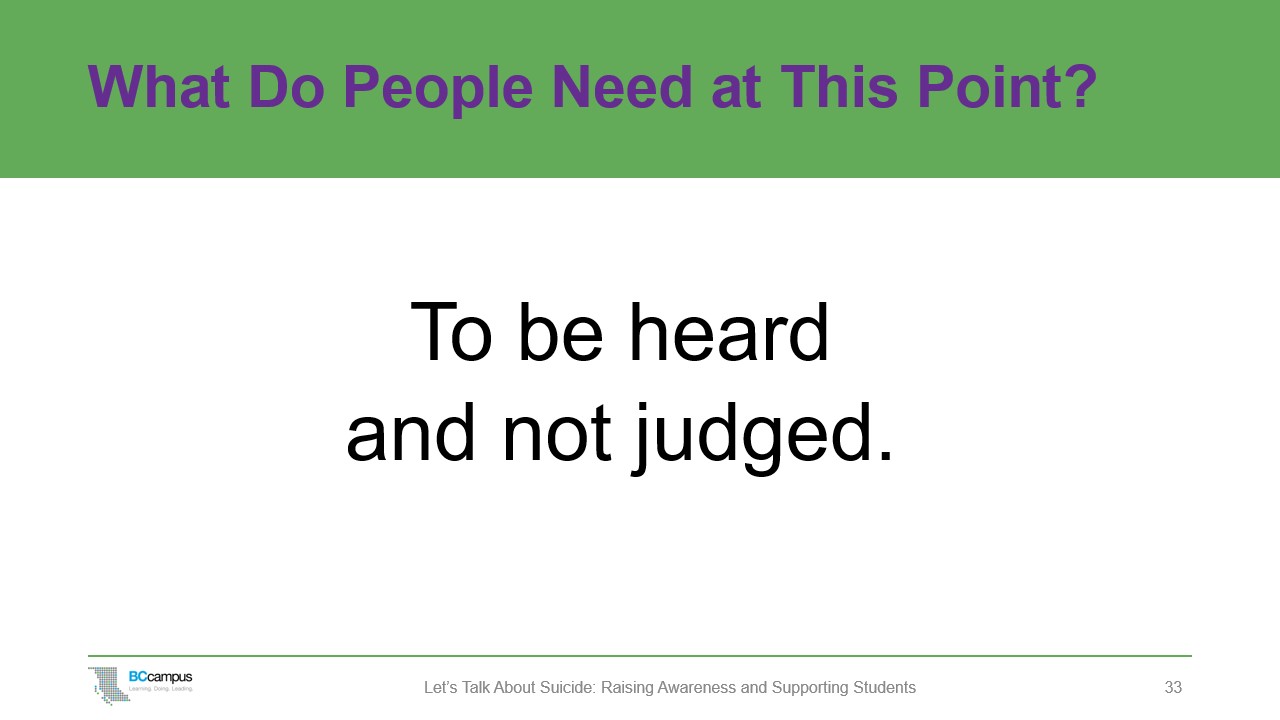
The main thing that people need is to be heard and not judged. The most effective intervention you can do is to listen with empathy and be non-judgmental.
Let the person know you hear them, believe them, and understand their distress as best you can. Tell them that you will help connect them to appropriate resources.
It does not have to be a lengthy conversation. Sometimes a conversation and a referral can be made within 10 minutes. What is most important is that the conversation is based on active listening and care. Sometimes just a few genuine words of concern and understanding can make a big difference and help get a person to connect with a counsellor or the best person to help them. You can’t take away their pain or solve their problems. But you can care.
There are no magic words. Be yourself. If you are concerned, your voice and manner will show it. Be patient, calm, accepting. This is more important than having the perfect words.
You may think that it’s all just talk and wonder how that’s going to help, but asking a person and having them talk about how they feel greatly reduces feelings of isolation and distress. Simply talking about their problems for a length of time will give a suicidal person relief from loneliness and pent-up feelings. They become aware that another person cares, and this can give them a feeling of being understood. A conversation can take the edge off their agitated state, and it may help them get through a bad night.
Communicate your concern for their well-being by offering to listen. Good listening is more than just listening quietly. It means demonstrating that you can be supportive without being judgmental. It means accepting their feelings as the truth for the person, no matter how irrational they might appear to you. It means that you are comfortable enough with your own feelings to set them aside and listen to theirs.
What Else Can Help?
- Approach with concerned care.
- Understand with empathy.
- Recognize and relate with kindness.
- Ask with respect.
- Lead with hope.
- Introduce help with community.
 Adaptations
Adaptations
To demonstrate how to respond in a helpful, compassionate way, you could show a short video from well-known sociologist Brené Brown: Brené Brown on Empathy. The BCcampus resource Capacity to Connect: Supporting Students’ Mental Health and Wellness has more information on developing empathetic listening skills if you want to explore empathy more with your group.
Starting the Conversation
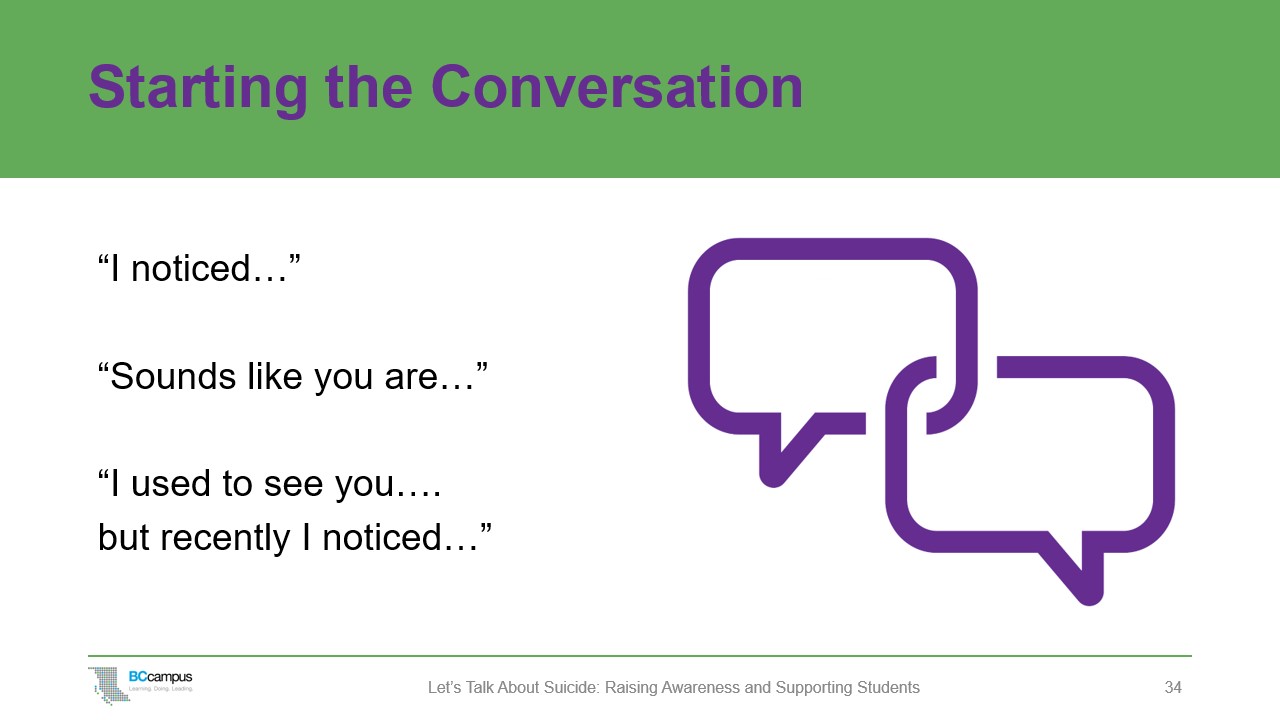
Here are some ways you can introduce the signs that you notice:
- “I noticed…”
- “Sounds like you are…”
- “I used to see you … recently I noticed…”
These questions can start a conversation with someone you are concerned about, and this is also just normal empathic human interaction. You can check things out without it being a scary conversation. The goal is to practise asking about things you have noticed and to probe and listen for other warning signs.
Ask Directly and Clearly
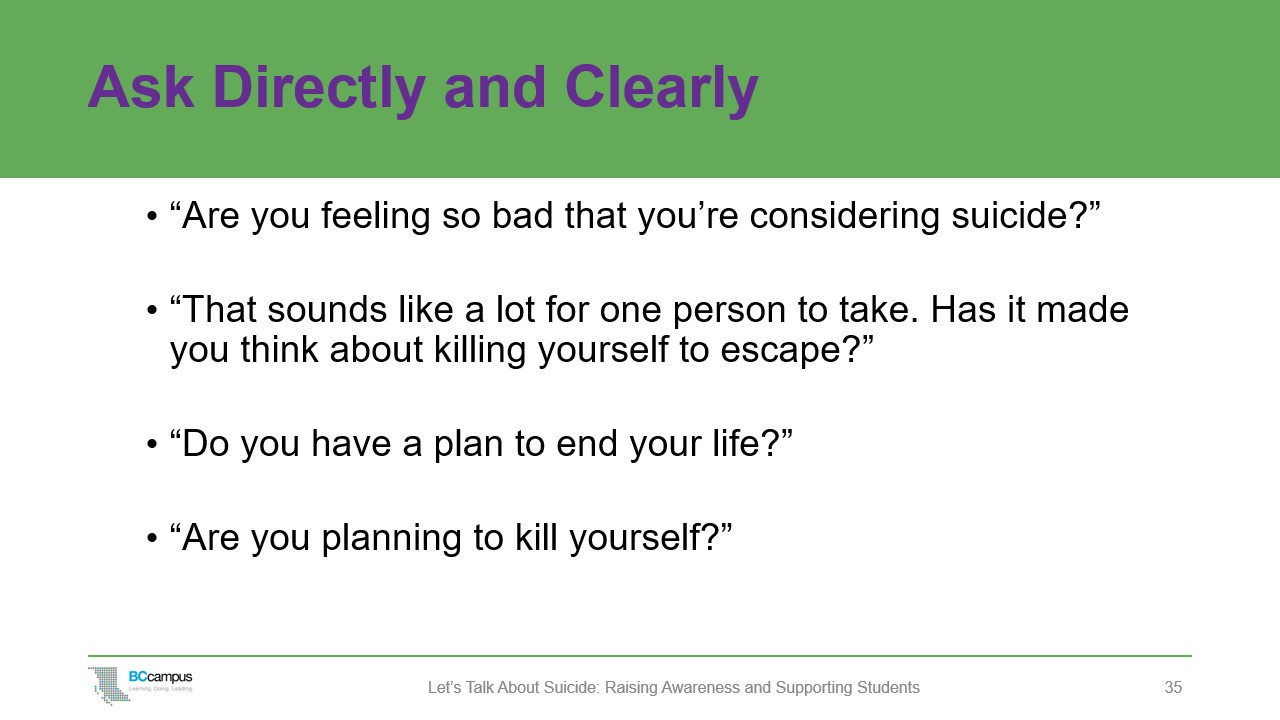
You could start with:
- “At this point I need to ask you something…”
- “I might be way off base, but when you said… I wondered…”
You could then ask directly: “Are you feeling so bad that you’re considering suicide?”
Or:
- “That sounds like a lot for one person to take. Has it made you think about killing yourself to escape?”
- “Do you have a plan to end your life?”
- “Are you planning to kill yourself?”
Other ways to ask about suicide:
- “Has all that pain you’re going through made you think about hurting yourself?”
- “Have you ever felt like just throwing it all away?”
- “I see what you are doing and how much you must be hurting. I’m concerned about you. I want to talk. I want to hear what’s going on with you.”
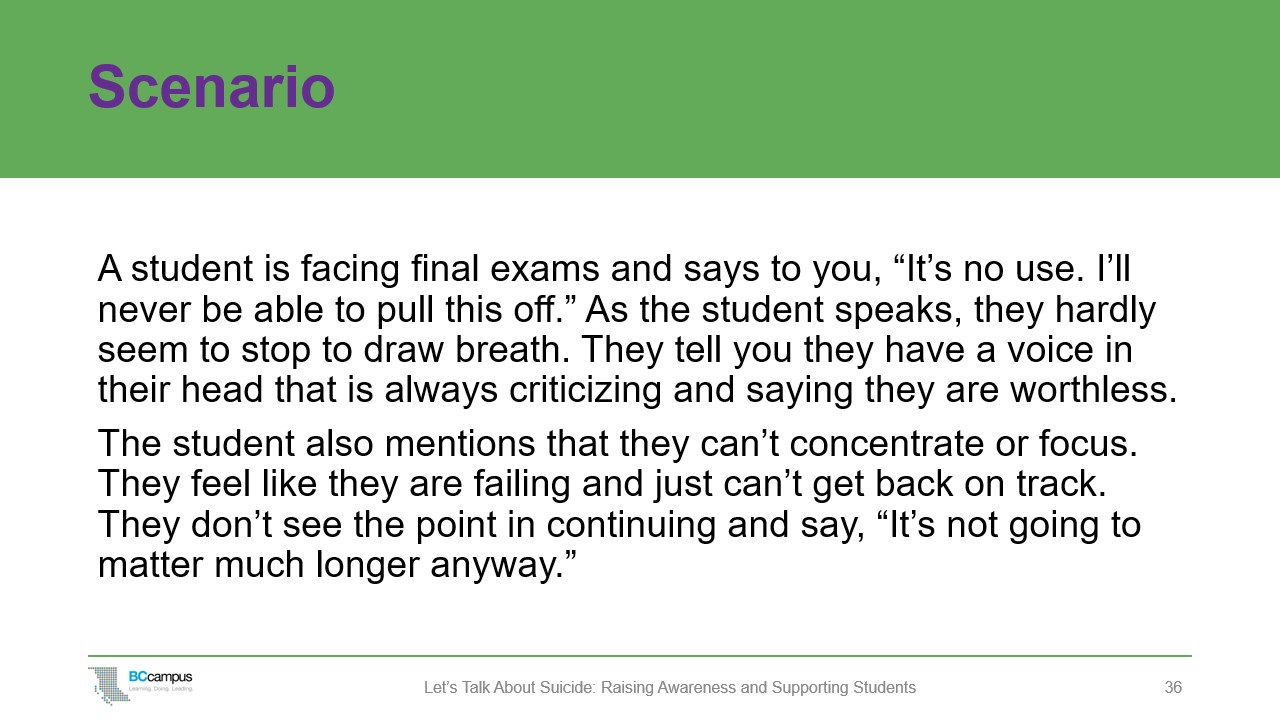
Scenario Walk-Through
To help help participants think about how they would talk to a student they’re concerned about, you could read the scenario out to them and then have a discussion about the best way to respond to the student.
Scenario
A student is facing final exams and says to you, “It’s no use. I’ll never be able to pull this off.” As the student speaks, they hardly seem to stop to draw breath. The student tells you they have a voice in their head that is always criticizing and saying they are worthless.
This student also mentions that they can’t concentrate or focus. They feel like they are failing and just can’t get back on track. They don’t see the point in continuing and say, “It’s not going to matter much longer anyway.”
How would you respond?
Key points
- Highlight support and empathy while recognizing the capacity of the student.
- Ask about suicide.
- Facilitate a referral or follow-up.
A possible response could be:
- Start with an empathetic response: I can see that you’re upset about the exam. I can hear the disappointment in your voice and understand the fear about what will happen for you.
- Ask directly about suicide: I may be way off base, but when you say you say “It’s not going to matter much longer anyway,” do you mean that you are thinking about suicide? I want to support you to be safe and to have a good outcome from this challenging time.
- Facilitate a referral: I wonder if you’d be willing to talk to a counsellor? It’s confidential and I think it’s a wise thing to do. I’d like to walk over there with you.
If the student refuses, you could say, Another option is for us to call the crisis line together right now so you can talk with them and find out about some resources.
If the student says no, you could say, I care about you and am worried about you, so for me to feel comfortable, I need to have someone contact you to see how you’re doing and help support you.
What If They Say No?
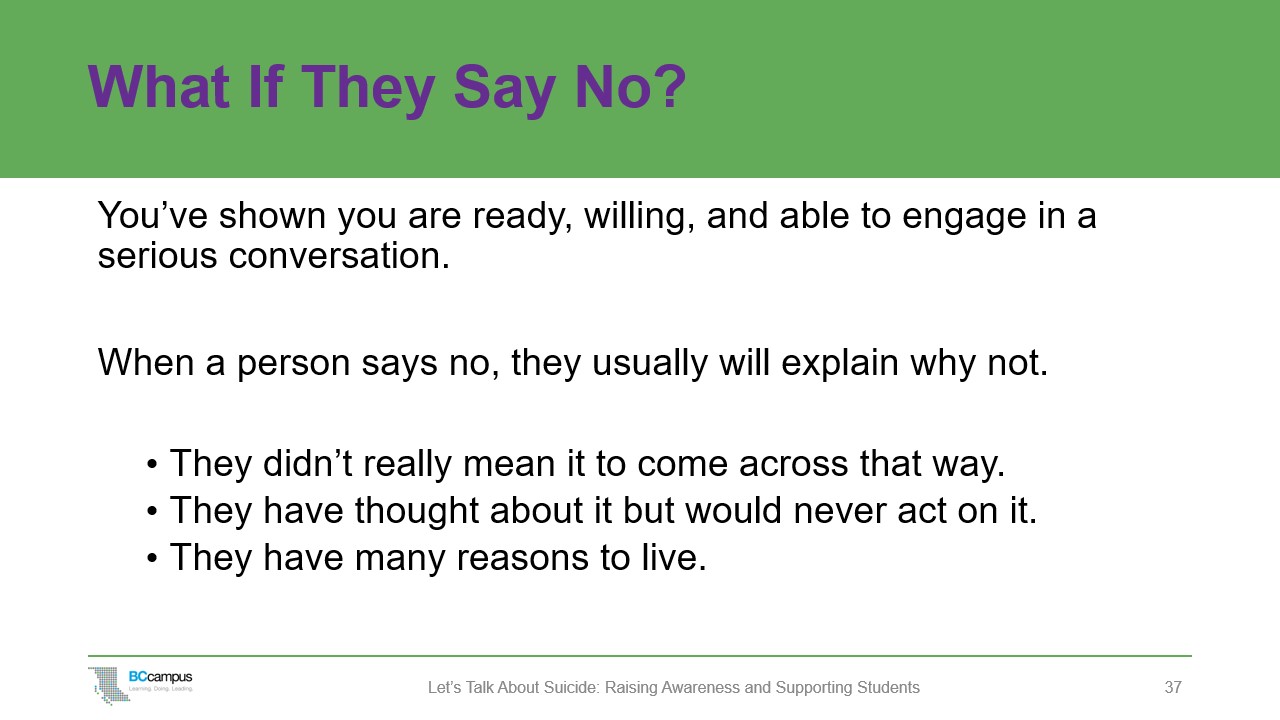
If the person says they are not thinking of suicide, accept their response. You’ve shown you are ready, willing, and able to engage in a serious conversation.
When a person says no, they usually will explain why not:
- They didn’t really mean it to come across that way.
- They have thought about it but would never act on it.
- They have many reasons to live.
They may say they have stronger reasons for living and usually are reluctant and have concerns about the effect on others they care about. Listen supportively and offer resources as necessary.
What If They Say Yes?
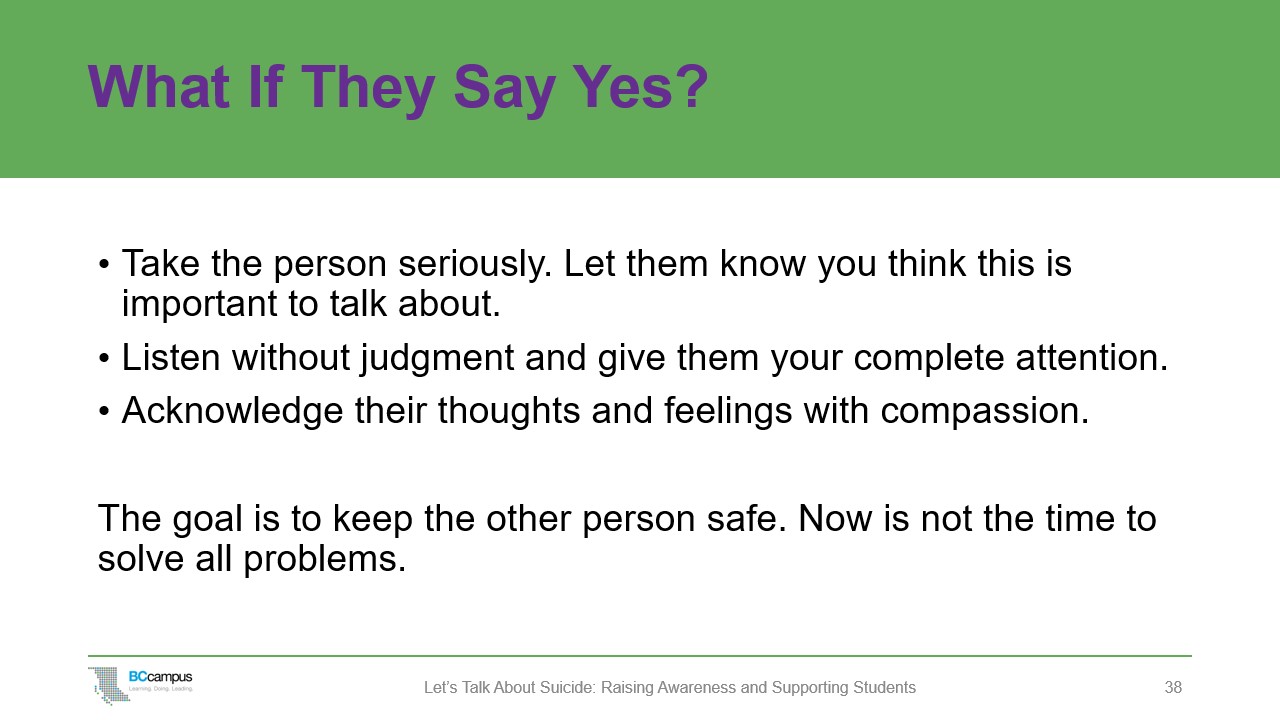
If a person says they are thinking about suicide:
- Take them seriously. Let them know you feel this is important to talk about.
- Listen without judgment and give them your complete attention.
- Acknowledge their thoughts and feelings with compassion.
The goal is to keep the other person safe. Now is not the time to solve all problems.
Consider the Risk
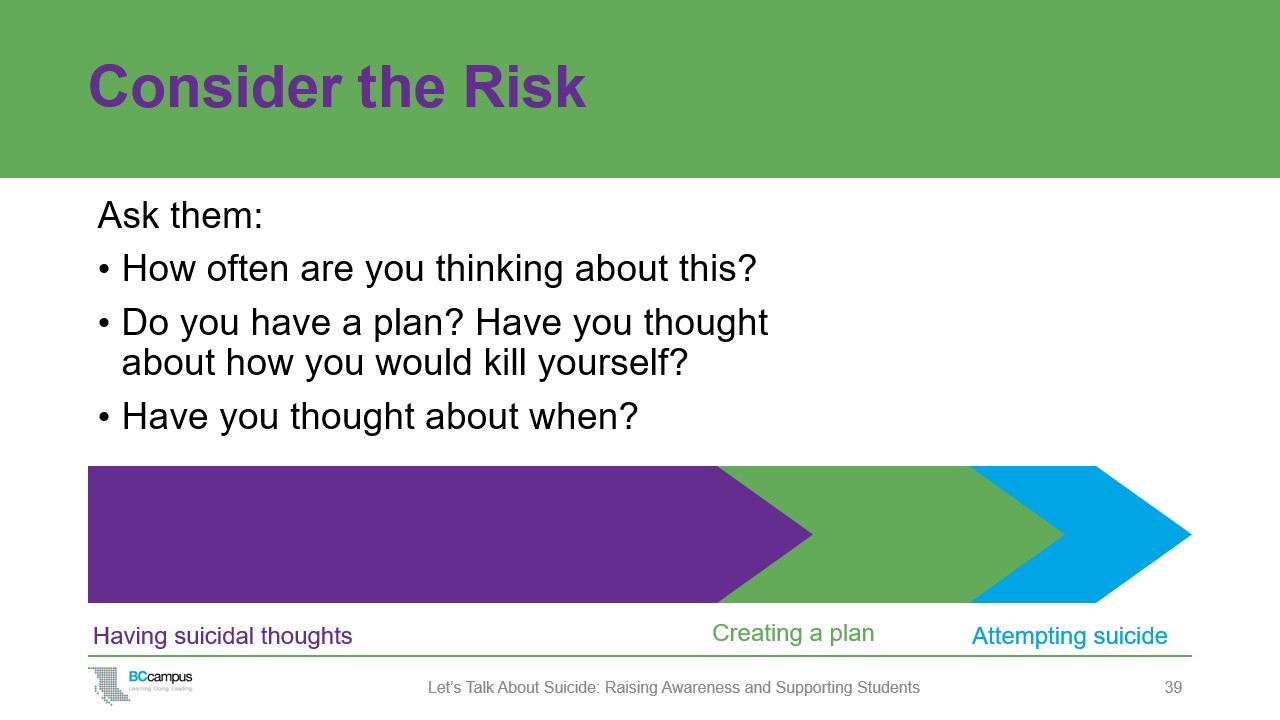
If a person says they are thinking of suicide, you need to consider the risk. Ask them:
- How often are you thinking about this?
- Do you have a plan? Have you thought about how you would kill yourself?
- Have you thought about when?
By asking these questions, you can get a sense of how serious they are. The more prepared they are, the greater the risk.
It is similar to taking a trip and the preparations a person makes before the trip. How serious is this person about the trip? Are they just talking about wanting to take the trip or have they started looking into trip destinations? Or are they really prepared for the trip and have already booked their flight and started packing their bags?
More often than not, people do not have a plan for suicide, but if the plan is immediate, if steps have already been taken (pills, self-harm), or if a conversation is not possible, call 911 and stay with them until help arrives.
What to Keep in Mind When Talking About Suicide
The most appropriate way to raise the subject will differ according to the situation, and what the people involved feel comfortable with.
When having a conversation about suicide, you want to:
- Ask directly about suicide.
- Ask the person about their supports. Do they have other people they can talk to? Have they talked to anyone else?
- Provide information on resources.
- Connect them with professional help.
- Stay with them if necessary until supports are assured and connections are made.
Text Attributions
- This chapter was adapted from Let’s Talk: A Workshop on Suicide Intervention by Dawn Schell, University of Victoria.
Media Attributions
- Slide 32: Trees and sunshine by Richs5812 is in Public Domain.
- Slide 34: Coloured icon with bubbles in different languages by Rodelar is licensed under a CC0 license.
- Brené Brown on Empathy by RSA is licensed under a Standard YouTube license.

